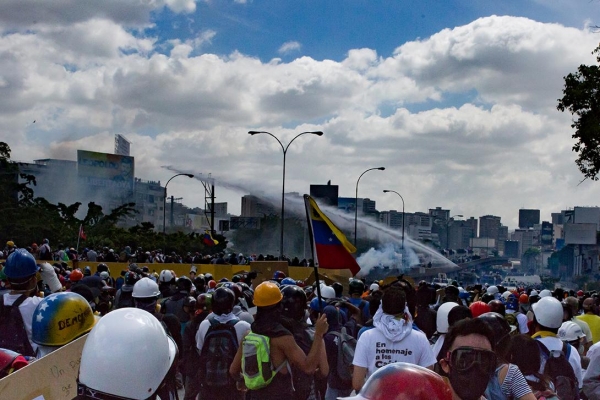The Joint Report, “Crackdown on dissent. Brutality, Torture, and Political Persecution in Venezuela”, published by Human Rights Watch and the Penal Forum in November 2017 recounts the groups’ in-country research, based on interviews to alleged victims of human rights abuses, their lawyers or witnesses such as medical professionals. HRW also reviewed multiple statistics, reports, press research available about human rights violations following the 2017 Venezuelan political crisis, as well as public statements by President Maduro and representatives of his cabinet, media outlets publications and social media feeds.
In April 2017, the Supreme Court, controlled by the government, attempted to empty the legislative branch of its power. This government-led move exploded in country-wide protests and fuelled discontent due to the political practices of the president Maduro, whom responded with brutality and violence to demonstrators and bystanders.
During protests in the streets, security forces systematically used weapons like water cannons, teargas, pellets, modified rubber-pellets shotgun shells loaded with shot marbles, broken glass or metal bolts.
Afterwards, authorities, such as the Bolivarian National Guard or the Bolivarian National Intelligence Services, unlawfully detained thousands of people, many of whom were victims of abuses and/or prosecuted in military courts or subject to arbitrary prosecutions lacking due process guarantees. Moreover, besides security forces, groups called “colectivos” often worked as local “paladins” too.
The abuses, carried out with the intent to punish the detainees or force them to incriminate themselves or others, soon became torture through the implementation of extreme measures such as electric shocks, severe beatings, hanging in stress positions, sleep deprivation, asphyxiation and sexual abuse or even rape. These mistreatments took place in small, overcrowded punishments cells called Tigritos, “little tigers”, where the detainees sometimes were even forced to eat food containing excrement of cigarette ashes.
The document’s findings (coherent with those of the Office of the High Commissioner for Human Rights) and numbers of victims of these events are shocking:
- 88 cases involving at least 314 victims of human rights abuses in Caracas and other 13 states;
- 53 cases of physical and psychological abuse (with at least 232 people involved);
- 28 cases of arrests of political opponents, lesser known activists, or people connected to the opposition;
- 10 Venezuelan police officers dead;
- 5400 or more people detained since early April;
- 3900 people still subject to arbitrary criminal prosecutions;
- 757 or more people prosecuted by military courts, in violation of international law.
To put an end to human rights violations and silence, HRW proposes several recommendations aiming to redouble international pressure on Maduro’s government. These specifically invite the Lima Group, the European Union and UN member states to press the south American president to release all people arbitrarily detained and drop politically-motivated charges, as well as impose targeted sanctions against Venezuelan officials responsible for the abuses. Similarly, it asks State parties to the Convention Against Torture to exercise criminal jurisdiction over any Venezuelan authority implicated in torture, and request the UN Human Rights Council to monitor the situation more closely and open an international investigation into human rights violations within the country, so to restore domestic judicial independence as well.
To know more, visit:




